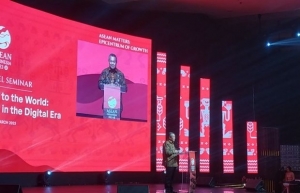Wider recognition a top reason for upping bank activity abroad
Why are Vietnamese banks going abroad?
 |
| Kent Wong, chairman of the Legal Committee at the European Chamber of Commerce in Vietnam |
According to a 2018 strategy for the Vietnamese banking sector, by the end of 2025 there should be 3-5 commercial banks listed on foreign stock markets and 2-3 banks in Asia’s top 100 banks by assets.
Moreover, Basel II standards have been compulsory to be adopted during the same period, so Vietnamese banks will be more competitive and compatible in market access overseas. Therefore, recent efforts by Vietnamese banks demonstrate that one of their approaches is to achieve recognition from foreign markets as a strategy and to develop the banking sector.
The main reason is that banks are following their clients abroad. When the likes of VinFast seek to list in the US, build production factories in North Carolina, and establish a presence in the European market, supporting industries and corporate banking follow. For example, King Coffee’s expansion outside of Asia into California and Dubai also encourages banks to venture further afield to support their corporate clientele’s banking needs.
The signing of free trade agreements also contributes to a significant increase in Vietnamese overseas investment and creates demand for Vietnamese banks in foreign countries to provide banking services. These agreements are opening huge opportunities for businesses investing abroad, facilitating banks to open branches in foreign countries to provide banking services.
Which services are they going to provide?
Well-known Vietnamese commercial banks have been setting up their business presence in other markets, mostly in Southeast Asia, for a while. Top-tier Vietnamese commercial banks like VietinBank, BIDV, Agribank, and Sacombank all have representative offices and branches located in Cambodia and Laos.
Banks like Sacombank, VietinBank, and SHB also established their Southeast Asian subsidiary banks. They can also initiate further approaches to overseas markets, including the establishment of subsidiary companies and financial investment companies.
Vietcombank is considering a listing on the US market after operating its first representative office in New York. Beforehand, Vietcombank’s overseas network includes Paris, Moscow, the establishments of a foreign financial company (Vinafico in Hong Kong), representative office (Singapore), money transferring company (United States), and branch (Australia).
Banking services such as support for credit such as letter of credit facilities for import and export activities, guarantees, asset financing, capital and international payment activities have also increased due to demand by overseas investment.
In addition, other emerging commercial banks have adopted their own approaches with specific strategies. VPBank has developed its offerings after being named the best foreign bond issuer in Asia in 2019. With its success in a bond issuance of $300 million, it became the first Vietnamese issuer of USD bonds in international capital markets since 2014.
Meanwhile, MBBank is the nominated bank by Investment Support Forum for Overseas Vietnamese to perform direct banking services and international monetary transfer for Vietnamese expatriates via its MBBank App platform.
What are the challenges of Vietnamese banks in these activities?
For Vietnamese banks, going abroad no longer means venturing to developing markets in Indochina such as Laos, Cambodia, and Myanmar. Although there is openness of market access to a certain extent for foreign investment in banking, this sector still maintains restrictions and there is a lack of competitive advantages that apply to foreign banks.
For example, there is a lack of a credit information centre system, limits on court proceedings, and supervisory management by the State Bank of Vietnam, which are all challenging factors for foreign investors, including Vietnamese banks, when expanding their services abroad.
In Cambodia, for example, the hustle of an open and free market creates a highly competitive market for giants, especially Chinese commercial banks. Consequently, Vietnamese banks face difficulties in both capacity and competitiveness.
Vietnamese banks are still passive and inefficient in their business strategy of overseas market access. Strict mechanisms and business models in Vietnam may not work properly and effectively in other markets with different environments and legal frameworks. For the most part, all investing banks can only approach a limited market segment, and acknowledgment and facilitation of targeting local customers appears limited.
How does the current economic situation affect their performance overseas?
Although Vietnam’s macroeconomy in the past year recognises impressive growth, there are many economic and financial threats to local businesses, including banks.
From the Vietnamese perspective, the vulnerable state of the real estate and bond markets creates certain pressures on commercial banks. Concern for prudential ratios and reserve funds for domestic transactions during this time may be more prioritised than expansion abroad.
From a global perspective, the instability of investment abroad due to political conflicts, the effects of high inflation, and fluctuating foreign exchange rates that have been progressing in superpower economies are important negative factors to the financial and banking sector, and for performance of overseas banking in particular.
 | Banks expanding share over borders Several Vietnamese lenders are tapping into other dynamic economies and aiding Vietnamese enterprises operating in cross-border trading activities. |
 | Vietnamese banks urged to embrace green financing Green growth and sustainable development have become a new trend in the banking sector. Bruce Delteil, managing partner of McKinsey & Company Vietnam, shares his views on how Vietnamese banks can take advantage of the opportunities in these areas. |
 | Central banks in ASEAN discuss economic priorities The ASEAN Central Bank Deputies Meeting (ACDM) took place on March 28 in Indonesia to discuss the priority economic deliverables (PEDs) in 2023. |
What the stars mean:
★ Poor ★ ★ Promising ★★★ Good ★★★★ Very good ★★★★★ Exceptional
Related Contents
Latest News
More News
- Banking sector targets double-digit growth (February 23, 2026 | 09:00)
- Private capital funds as cornerstone of IFC plans (February 20, 2026 | 14:38)
- Priorities for building credibility and momentum within Vietnamese IFCs (February 20, 2026 | 14:29)
- How Hong Kong can bridge critical financial centre gaps (February 20, 2026 | 14:22)
- All global experiences useful for Vietnam’s international financial hub (February 20, 2026 | 14:16)
- Raised ties reaffirm strategic trust (February 20, 2026 | 14:06)
- Sustained growth can translate into income gains (February 19, 2026 | 18:55)
- The vision to maintain a stable monetary policy (February 19, 2026 | 08:50)
- Banking sector faces data governance hurdles in AI transition (February 19, 2026 | 08:00)
- AI leading to shift in banking roles (February 18, 2026 | 19:54)

 Tag:
Tag:




















 Mobile Version
Mobile Version